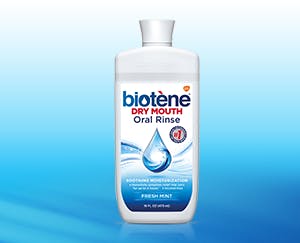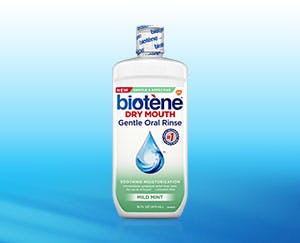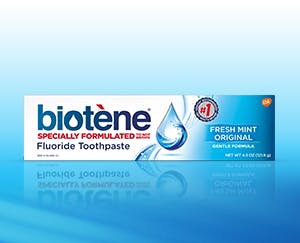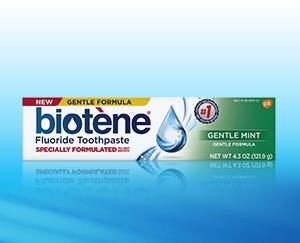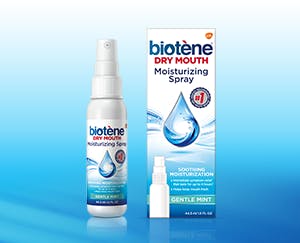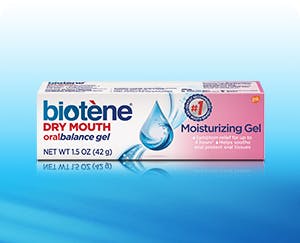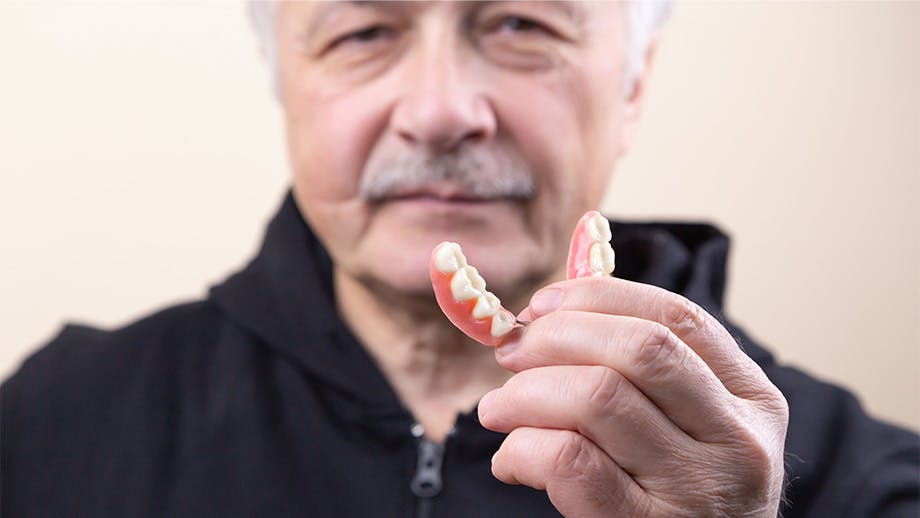
Dry mouth, or xerostomia, can be a problem: your body isn’t producing enough saliva, which helps to wash away food and debris, helps protect your teeth, jumpstarts your digestion by helping to break down food and helps fight off infections.1 When you’re not making enough saliva to accomplish these tasks, taking care of your mouth and teeth can feel like a larger task. And for those who wear dentures, dry mouth can feel like an additional hurdle.
Do Dentures Cause Dry Mouth?
In short: no, dentures do not cause dry mouth. Dry mouth is caused by a lack of saliva for long periods of time, which is commonly attributed to:2,3
- Medications: Prescriptions that help various conditions like depression, asthma, Parkinson’s disease and others, as well as some over-the-counter medications
- Medical treatments: Some types of chemotherapy, head and neck radiation and more
- Chronic diseases: Diabetes, depression, hepatitis C and others
Denture Issues with Dry Mouth
If you’re a caregiver for someone with dentures, or if you wear them yourself, it’s important to be aware of the ways that dry mouth can affect your dental appliances as well as your oral health.
Denture Fit and Dry Mouth
Saliva helps improve denture retention, which means that it helps hold dentures in place on the gums.2 If the lack of saliva is causing your mouth to feel dry, the denture may feel loose.2 This may be worsened as you age because the supportive tissues in your mouth shrink in size, which means that your dentures and gums no longer match up perfectly.2 While this is the case with everyone who wears dentures, it becomes more noticeable with a dry mouth.
You may need to visit your dentist so the denture can be evaluated. After a professional exam, your dentist might suggest having your dentures remade or having an existing denture relined to help it conform to the shape of your gums.2 If you’re suffering from a dry mouth, regularly visit your dentist to have your appliance checked out, especially if it’s no longer fitting as well as it used to.
Eating
When you have dry mouth, chewing and swallowing can be difficult due to the lack of lubrication that would otherwise be provided by saliva.2 This can be especially true for those who wear full or partial dentures. To help improve eating with dentures and dry mouth, sip water frequently during meals and try to add sauces to drier foods.2
Affects Other Natural Teeth
For older adults who have dry mouth, tooth decay is the most common cause for tooth loss.2 For those with remaining natural teeth, it’s important to take good care of them so they’re not compromised by your full or partial dentures. Since you have limited amounts of saliva that would neutralize the plaque bacteria that cause tooth decay and to help redeposit minerals to your teeth, you may be more likely to develop cavities.2 Talk to your dentist for ways to manage the health of your teeth; they’ll be able to provide some solutions that take your denture into account.
Managing Dry Mouth with Dentures
To help reduce the discomfort with dentures, you’ll need to take special care. Take your dentures out every night before going to sleep and clean them with a denture cleanser, such a Polident, according to the directions provided by your dentist or prosthodontist depending on the material it’s made of.4
Other ways to care for your teeth when you have dry mouth is to avoid toothpastes that are particularly abrasive.4 This typically means toothpastes that are considered whitening, tartar control or pastes designed for smokers.4 Instead, reach for a toothpaste that’s designed especially for those who experience dry mouth. Biotene Fluoride Toothpaste is specially formulated to freshen breath and strengthen teeth without causing irritation like other toothpastes.
For those who need dry mouth symptom relief all day, use Biotene Moisturizing Spray as needed for instant relief, soothing moisturization, and to help with breath freshening.
Source Citations:
- Saliva. Mouth Healthy. https://www.mouthhealthy.org/all-topics-a-z/saliva/. Accessed 6/7/23/
- Dry Mouth and Dentures. University of Michigan. https://www.med.umich.edu/1libr/Dentistry/DryMouth&Dentures.pdf. Accessed 6/7/23.
- Dry Mouth (Xerostomia). American College if Prosthodontists. https://www.gotoapro.org/dry-mouth/. Accessed 6/7/23.
- Management of Dry Mouth. Johns Hopkins Sjogren’s Center. https://www.hopkinssjogrens.org/disease-information/treatment/management-of-dry-mouth/. Accessed 6/7/23.


